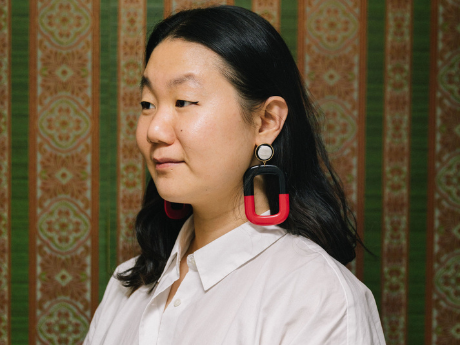In Their Own Words
Wendy Xu on “Wang Xin Tai Says Goodbye”

Wang Xin Tai Says Goodbye
Some things are not so plain to say, that I
am sometimes in pain and occasionally sit
to write my name in dark inks and the brush
goes wobbly, as if excited into shapes
without me. The crop fields of someone’s childhood
still bother the edges of my vision, tawny
gridded country, low born, wind gripping the assembled
heads of wheat, bristling. One job seems now
just like another. I was a worker in a factory,
a prison, other places ill-defined. But I remember best
the war, the American G.I.’s. They taught me
my English swears, whole rooms cleared of men
and dogs as I cursed them up and down, my hand
on my little lieutenant’s hip, the green
and the muddy browns. In this life I even crossed
the ocean in an airplane, drank too many coca-colas
on the flight, ordered with flashcards
I stored beneath my hat. It wasn’t profound.
At the end, your life doesn’t really churn before your eyes.
It’s not a colossus that plays itself back
upon the eyelids like a final prayer. But the soda
was good, sweet. It popped and sang
on my tongue like English, someone remembering
me in the present tense.
From The Past (Wesleyan University Press, 2021). Copyright © 2021 by Wendy Xu. Reprinted with the permission of the poet.
On “Wang Xin Tai Says Goodbye”
Wang Xin Tai was my maternal grandfather who passed away in 2018, and this poem is the only persona poem I have ever written. It appears in the title section of my book The Past, among other elegies for my Uncle, for the children I used to be, and the time I’ve lived through. While I was struggling through the writing of this poem, I thought to myself many times about how persona doesn’t comfort the dead, though I desperately wanted it to, and though it comforted me. I found the whole process unnerving, challenging, and at moments extremely moving as I learned how to sit with my grandfather inside the room of the poem—of course my grandfather in the poem exists only as a collection of the things he loved most to talk about, the most public and legible events of his life. And of course I sat with my grandfather as a way to sit with myself, my sorrow. As a poet I write in English, a language I often hate while at the same time the hours I spend creating with/in it keeps my alive, feeds my whole spirit. My grandfather’s life experiences were thoroughly in Mandarin Chinese, and English was, for him, solely for play—he knew exclusively curses and delighted in using them to shock and offend any potential English speakers in the room. How can I remember him, write him well, in this language? Does he hate this poem? Too proper. Though in life he wanted to be translated into English constantly, to hear his thoughts in my voice, the language I grew up inside. When he visited America he helped me practice my Mandarin, and I taught him animals and colors in English. When I remember him, as in the poem, I like to imagine him knowing he is being remembered, in all times and tenses—in English, the tool I’m resigned to use.



